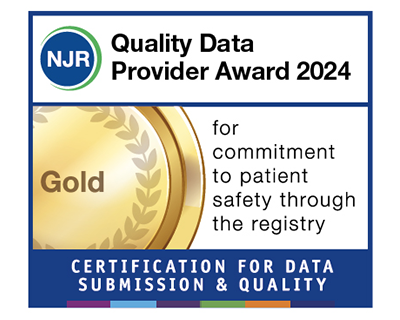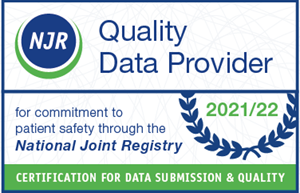Knee Replacement Surgery at North Downs Hospital
What is a knee replacement?
Knee replacement, also called a knee arthroplasty or arthroplasty of the knee, is knee surgery performed to replace the painful and worn surfaces inside your knee joint with artificial knee parts. These parts are made from metal, plastics, or ceramics.
Knee surgery can reduce pain and improve your range of movement, helping you get on with your everyday life without your knees holding you back.

Why go private for a knee replacement?
One of the major advantages of seeing a knee surgeon privately is that your appointments and treatment can be arranged at times that suit you, without any unnecessary waiting. This is especially important if you’re in a lot of pain or if you want to avoid particular dates for surgery.
You’ll be treated by an experienced Ramsay Health Care orthopaedic surgeon with a special interest in knee surgery, of your choice. They will discuss your individual needs and select the best prosthesis for you.
Types of knee replacement surgery
When you have knee replacement surgery (a knee arthroplasty), your surgeon will replace the damaged, worn, or diseased cartilage and bone in your knee with a prosthetic joint. This joint is made of plastic with a metal alloy or ceramic sandwich.
There are three main types of knee replacement operation:
Total knee replacement (TKR) surgery
The entire knee joint is replaced with a prosthetic joint. Sometimes the undersurface of the kneecap (patella) is also replaced. This is the most common type of knee replacement operation, usually performed when the knee joint is affected by severe arthritis.
Partial knee replacement (PKR) surgery
Also called unicompartmental or "half-knee" replacement, as only the damaged part of the knee is replaced and not the entire joint. Partial knee replacement surgery is usually performed when damage or wear is limited to only one of the three compartments of the knee (the three main areas where bones meet in the joint).
Revision knee replacement (RKR) surgery
A revision knee replacement is corrective surgery for a previous total knee replacement that has worn out, loosened, become infected, or failed for another reason. The old prosthetic parts are removed and replaced with a new prosthetic knee joint.
Your knee surgeon will discuss the most appropriate surgery for you.
How do you know if you need a knee replacement?
Although people may need a knee replacement operation at any age, it is more common in older people between 60 and 80 who have experienced conditions like arthritis or osteoporosis. Genetics and previous lifestyle, such as playing certain sports, may make you more susceptible to arthritis and knee damage.
Initially, you might visit your GP if you’re experiencing persistent pain, stiffness, and loss of motion in your knee. They will likely conduct a physical examination, order an X-ray of your knee, or perform a blood test to diagnose the underlying problem.
They may recommend non-surgical treatment options or refer you to a consultant orthopaedic surgeon to discuss knee replacement surgery.
Knee replacement surgery is typically recommended if:
- You have debilitating pain and/or a loss of range of motion in one or both of your knees due to arthritis, another illness, or an injury
- This pain and loss of motion affects your quality of life, making it difficult to perform daily tasks, work, socialise, or sleep properly. These limitations can be considerable, and lead to other conditions like depression
- You have already tried non-surgical treatments, such as non-steroidal anti-inflammatory drugs (NSAIDs), physiotherapy, and corticosteroid injections, but they have failed to relieve your pain
Read more about the signs you need a knee replacement.
What conditions may lead to needing a knee replacement?
Knee replacement operations are needed when parts within the knee become damaged. Usually, the smooth cartilage that covers and protects the end of bones in the knee joint is damaged or entirely lost, meaning bones move against each other, causing pain, stiffness, and loss of motion.
Knee damage of this kind can be caused by:
- Different types of arthritis, most often osteoarthritis or rheumatoid arthritis
- A knee injury
- Inflammatory conditions like psoriatic arthritis or lupus
- A knee deformity (usually a misalignment of the knee joint that you’re born with)
- Gout
- Haemophilia
- Osteonecrosis (Avascular Necrosis) - damage of the knee due to a lack of blood supply
How long does a knee replacement last?
Your knee replacement should last at least 10 years and up to 20 years. Most people experience less pain and improved mobility following their knee replacement.
How long does a knee replacement operation take?
A knee replacement operation can take up to two hours depending on the type of knee replacement surgery you have.
Preparing for knee replacement surgery
To boost your chances of having a successful knee replacement operation and a good recovery, you should take steps to make sure you’re in a healthy condition before the procedure, such as:
- Doing your best to lose excess weight
- Being as active and fit before your surgery as you can (low-impact exercise is best, like walking and swimming)
- Eating a balanced diet
- Reducing your alcohol intake (don’t drink any alcohol for at least 48 hours before your operation)
- Stopping smoking
- Assessing your medication – your consultant can advise if you should continue taking your regular medications before surgery
You should also make the following practical preparations before your knee surgery:
- Make sure you understand your surgery and what will be required in your recovery
- Follow all the instructions given to you before your operation
- Ask for support from family members and/or friends beforehand, making it clear what help you’d like
- Remove all trip hazards from your home, as your mobility will be limited after your operation
- Find ways to make it easier to navigate around your home with limited mobility, such as adding handles in bathrooms or temporary ramps to cover small steps
- Stock up on food and supplies before your surgery, as popping out to the shops won’t be as easy during your recovery
Find out more about a hospital stay with Ramsay, including what to do before you come to us.
What to expect during a knee replacement procedure
Knee replacement surgery can be carried out under a general or spinal anaesthetic. Your surgeon and anaesthetist will discuss which option is best for you.
During the operation, your surgeon will make a longitudinal (lengthways) cut down the front of your knee. They’ll move your kneecap to one side to reach the joint beneath.
The surgeon will remove the worn and damaged ends of your thigh bone and shin bone and shape them to fit the prosthetic implant they’re going to add. Your thigh and shin bone meet in three places (three compartments). With a total knee replacement, cartilage and bone will be removed from all three compartments. With partial knee replacement surgery, only one compartment will be operated on. In some cases, cartilage and bone will be removed from the underside of your kneecap and replaced with a new surface.
The prosthetic will be bonded to your shin and thigh bones using medical cement impregnated with antibiotics. Once the prosthetic joint is in place, your surgeon will reposition your kneecap and close and your cut.
What happens after knee replacement surgery?
After your knee surgery, you'll be taken to a recovery area to recuperate. You may need to stay in the hospital for a time after your operation. How long you stay will depend upon your surgery and your condition.
You’ll face a higher risk of blood clots after knee replacement surgery. To prevent the chances of this happening, you may be asked to:
- Wear compression socks or air sleeves on your lower legs to stop blood pooling in your lower legs and keep it moving
- Take blood thinning medication
- Move early and often. You’ll be encouraged to walk with crutches or a walker as soon as possible after surgery to keep the blood moving in your legs
After knee replacement surgery, you’ll need to exercise, as advised by a physiotherapist. This will help you get back on your feet and recover from the operation with good mobility. You can find more advice on recovering from a knee replacement here.
Knee replacement recovery time
At Ramsay, we know a speedy recovery is vital. Aftercare is a valuable part of the service we provide, and we aim to get you back to normal life as soon as we can.
Your recovery in hospital
After your knee replacement procedure, you’ll need to stay with us in the hospital until we’re confident you’re ready to go home – usually for one to four days.
One of our physiotherapists will help you get out of bed and stand using a walking aid, like crutches or a walking frame. They will also explain and demonstrate exercises you can do at home to help strengthen your knee and aid your knee replacement recovery. They can offer advice about everyday living and what you should and shouldn’t do.
The first two weeks after your knee surgery
Although you will need to rest following surgery, you will also be encouraged to move with the help of your walking aid.
Two to six weeks after your knee surgery
From two to six weeks, you’ll be more mobile and spend more time on your feet. By the end of this period, you may be able to walk without crutches or a frame. You may be able to drive and return to work.
Six to 12 weeks after your knee surgery
Around three months after a total knee replacement, you should be able to live your life as you did before, although vigorous activities and contact sports may no longer be suitable.
How painful is a total knee replacement?
You’ll be placed under anaesthetic during your knee replacement surgery to stop you from feeling any pain. After the operation, you can expect to feel some pain and you’ll have some swelling and bruising in and around your knee. Every patient is different, but you can expect it to take up to three months for the pain and swelling to settle down.
If you experience new or increasing pain in the weeks following your surgery, you should inform your healthcare provider.
How long are you out of work following a knee replacement?
The amount of time you’re out of work following a knee replacement operation will depend very much on your circumstances, including your health, how you respond to knee surgery, how you heal, and what type of work you do.
If you have a desk job, you may be able to return to work from six to eight weeks after your knee replacement. If your job is more physically demanding and involves a lot of heavy lifting, standing up, or walking for long periods, you may need to take 12 weeks off work or even longer.
You’ll also need to think about how you get to and from work, factoring in the amount of painkiller medication you’re taking, as some can cause drowsiness. If possible, a phased return to work, ideally with some work-from-home time, maybe the best option.
How long does it take to walk after a knee replacement?
The time it takes to walk after a knee replacement will vary from person to person.
You’ll be encouraged to stand and walk while in the hospital, usually from day one, with the help of a walking aid, like crutches or a frame. Most patients can walk with a walking aid within a week or less after the operation.
As you keep walking and exercising, you’ll gradually build strength and stability. Most patients can walk unaided after about six weeks and return to longer walks and other activities, like a round of golf, by around three months.
When can you drive after a knee replacement?
How fast you can return to driving after knee replacement surgery will vary by patient and depends on how well you recover and respond to the operation. It will also depend on whether you drive an automatic or manual, and which knee was operated on.
Most people can drive safely between three to six weeks after their knee surgery, but it can take a little longer if it’s your left leg that was operated on and/or you drive a manual car.
Do’s and don’ts after knee replacement surgery
Your surgeon or physiotherapist will advise you on what to avoid in the first few weeks after your knee surgery and beyond. But the following is a helpful general checklist:
Do’s after knee replacement surgery:
- Use crutches or a frame for support
- Try walking without an aid after around six weeks if you feel ready
- Walk around for five minutes every hour to prevent blood clots
- Stay well hydrated
- Take your prescribed medications
- Wait at least six weeks until you drive after a total knee replacement or three weeks for a partial knee replacement
- Keep your leg raised to avoid swelling
- Avoid twisting, bending down, and reaching upwards until you’re confident your knee is stable
- Avoid flying for a minimum of six weeks before and after surgery
Don’ts after knee replacement surgery:
- Sit with your legs crossed for the first six weeks
- Sleep with a pillow under your knee, as this can put a strain on the joint
- Kneel on your new knee until the doctor says you can
- Do any household tasks that involve lifting or moving heavy objects for the first three months
- Stand for long periods, as this can cause swelling
- Ignore signs of complications after your knee surgery, like redness, warmth, swelling, fever, or increasing pain, as these can indicate you have an infection or a blood clot
Mr Marcus Cope, Consultant Orthopaedic Surgeon answers some additional questions around what you can do after knee replacement surgery here.
Potential risks and complications of knee replacement surgery
Just as with any surgery, knee replacement surgery carries the risk of complications, including:
- Pain
- Swelling
- Stiffness
- Nerve damage
- Damage to blood vessels
- Infection of the surgical wound
- Excessive bleeding
- Blood clots
- Heart attacks
- Strokes
If you think you’re developing any symptoms of complications after your knee replacement operation, you should see medical attention right away.
Alternative knee treatment options
If you’re experiencing knee stiffness and pain, but aren’t at the point where a knee replacement is needed, there are a range of other treatment options open to you, such as:
- Lifestyle changes: Including losing excess weight, eating a healthier diet, and exercising more
- Physiotherapy: To help strengthen your knee joint and the surrounding muscles
- Corticosteroid injections: To reduce inflammation, stiffness, and pain
- Other medications: Like NSAIDs and painkillers of various strengths
If these don’t work or aren’t suitable, other surgical options can be tried before knee replacement is required. One option may be arthroscopic knee surgery, a type of keyhole surgery using an arthroscope – a small camera on a slim, flexible scope that can be inserted into the joint.
Arthroscopic knee surgery can include:
- Arthroscopic washout: The knee joint is flushed with fluid to remove loose bone or cartilage
- Microfracture: Small holes are made at the end of your bones to stimulate cartilage growth
- Mosaicplasty: Healthy cartilage is taken from the edge of your joint and transplanted to the damaged area
- Osteotomy: Your shin bone is realigned to reduce the weight carried by the damaged part of your knee
How much does a knee replacement cost?
The cost of knee replacement surgery will depend on the type of knee surgery you have (partial or full), where you have it, and how you’ll pay for your knee surgery.
You can pay for your knee replacement surgery with a single one-off payment at a pre-agreed price with our all-inclusive TotalCare package, delivering direct access to all the treatment and care you need for complete reassurance. We also have a range of self payment options available for your knee surgery, including 0% payment plans.
If you want to pay for your knee replacement with private medical insurance, we can work directly with your insurer to arrange payment. We recommend you check with your insurance provider and get written confirmation before commencing treatment that your knee replacement is covered by your medical insurance policy.
Knee Replacement Surgery with Ramsay Health Care
We have more than 40 Ramsay Health Care hospitals across the UK, each ensuring you receive the very best of care and all the support you need before, during, and after your surgery.
Our leading knee surgeons are supported by orthopaedic nursing staff, consultant radiologists, and chartered physiotherapists to deliver your personal treatment plan.
We understand the debilitating nature of knee pain which may be putting your life on hold. Our aim is to provide you with fast and convenient appointments for the diagnosis and treatment of your knee problem so that we can quickly lessen your pain and get you moving again.
Contact us to find out more about knee replacement surgery with Ramsay Health Care.


